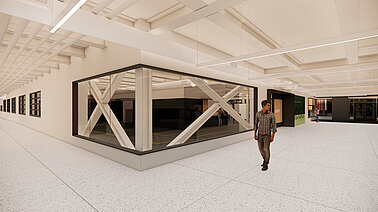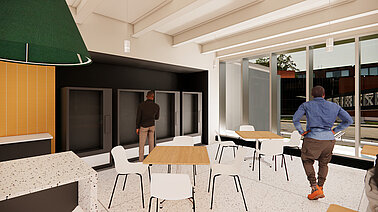IGNITING INNOVATION, EMPOWERING ENGINEERS
The new Richard Offerdahl '65 Engineering Complex is being built in the heart of campus and will open in Fall 2026. It is designed to propel the College of Engineering into the future and elevate the student experience by providing state-of-the-art spaces that emphasize teamwork, communication, and interdisciplinary learning.
The NDSU College of Engineering is the largest contributor to the engineering and computer science workforce in North Dakota, and its graduates are making a difference around the state, region, and world. Of more than 100,000 living NDSU alumni, more than 20,000 are proud engineering or computer science graduates.
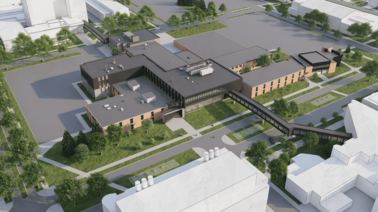
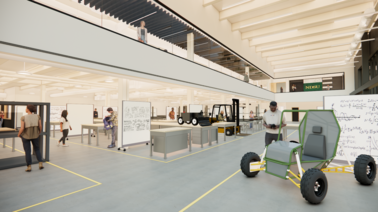
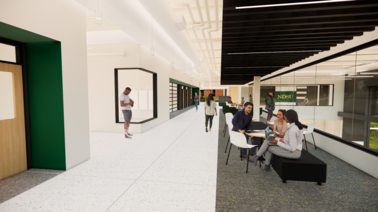
INVESTING IN THE FUTURE
Thanks to a historic $25 million gift from Richard and Linda Offerdahl, $59 million in funding from the North Dakota Legislature and leadership gifts from Doosan Bobcat, Mortenson, Marvin, and numerous other benefactors NDSU’s College of Engineering is not just building for today — it’s transforming for the future.
The Richard Offerdahl '65 Engineering Complex is designed with innovation at the forefront. State-of-the-art multi-purpose research and learning spaces will provide the resources necessary to meet the University’s — and industry’s — evolving needs.
Offerdahl Hall will also give NDSU a critical edge in recruiting and retaining students, faculty, and staff who are driven by a passion for engineering, computing and construction and a desire to create the future of our state, region, and world.
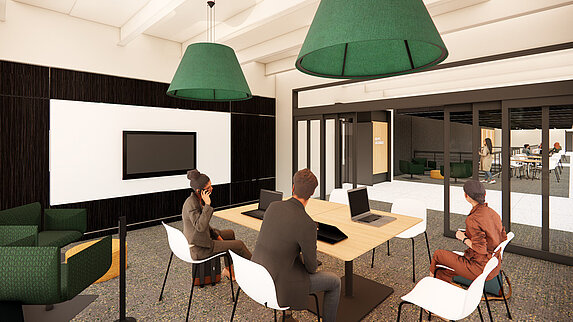

“The Richard Offerdahl '65 Engineering Complex will give our students, faculty, and staff the resources they need to excel at the highest level,” Alan Kallmeyer, interim dean of the College of Engineering, said. “NDSU engineers, computer scientists and construction managers are doing work that changes the world — and that work requires resources like dedicated space, upgraded equipment and laboratories, and dynamic tools to solve pressing problems. This new, visionary facility will be a showcase for the University, highlighting the amazing work happening within the College and putting engineering, computing and construction on display.”
“I think we all can agree innovation is at the center of NDSU’s College of Engineering. Bison students, faculty, and alumni are challenged to change the way that we think, the way that we interact, and the way that things are done for the betterment of society,” Paige Sanders ’26, an environmental engineering student, said. “With the addition of new state-of-the-art labs, workshops, and collaboration centers, we will be able to empower students to push the boundaries of what we know as engineers, and the impact of our work will reach not only beyond the University, but beyond the state of North Dakota.”
Construction of the new Offerdahl Hall and renovations to the existing buildings in the Richard Offerdahl '65 Engineering Complex reached a major milestone and the project remains on schedule to open for classes in Fall 2026.
Work Completed to date:
- Demolition of Engineering Administration Building
- Waterproofing and drain tile for Offerdahl West and North
- Site excavation
- Footings and foundations for main building and north skywalks
Current work:
- Setting structural steel
- Setting precast
- Mechanical, electrical and plumbing underground rough-ins
- Small areas of existing building renovations beginning
Next on the schedule:
- Foundations for south skywalk
- Exterior framing begins
- Pouring concrete slab on deck
- Start interior framing
- Dolve 2nd floor renovations beginning after spring semester ends
- Offerdahl North renovations beginning after spring semester ends

ENGINEERING ON DISPLAY
Enter the Richard Offerdahl '65 Engineerign Complex and experience what it means to be an engineer, computer scientist and construction manager. Featuring large windows and a centralized, interdisciplinary hub, Offerdahl Hall's new makerspace, student headquarters, and teaching and research labs will showcase all our majors in action.
COLLABORATIVE DESIGN STUDIO
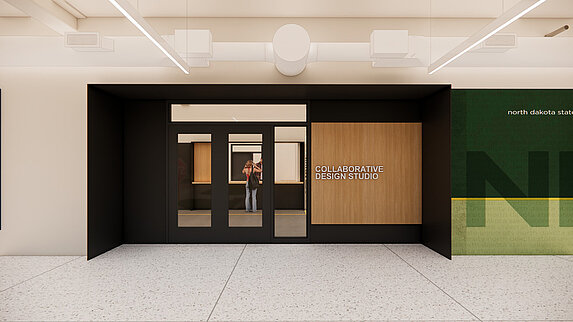
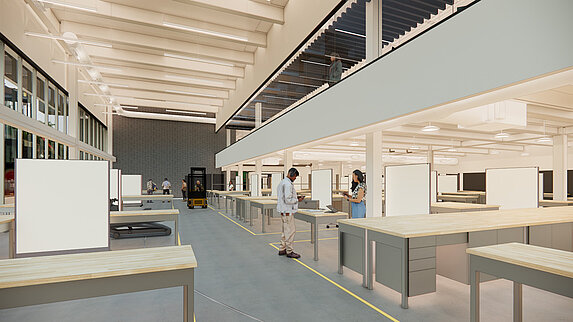
It takes a multi-disciplinary team to problem-solve and execute aspirational projects. Walk through Offerdahl Hall’s main doors and take in a 360-degree view of hands-on activities. With a metal fabrication facility, wood shop, welding lab, paint booth, electronics workbenches, and extensive 3D printing capabilities, this lively communal makerspace will spur entrepreneurial activity and invite students from all program areas to work side-by-side, exchange ideas, and find solutions to the industry’s most pressing needs.
FLEXIBLE TEACHING AND RESEARCH LABS


Designed to adapt to changing needs across the University and industry, flexible teaching and research labs in areas like advanced additive manufacturing, artificial intelligence and data science, robotics, microelectronics, energy systems, concrete and soil, advanced materials, and environmental testing will offer students, faculty, and staff multi-purpose, interactive spaces to explore and solve important societal problems. These research spaces will also help faculty and staff advance their inspiring research programs that help NDSU maintain its Carnegie Research 1 status.
COLLEGE COMMONS
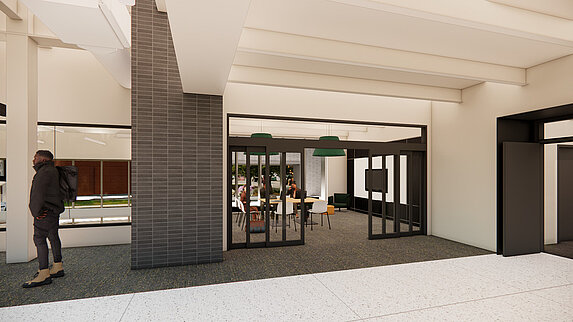
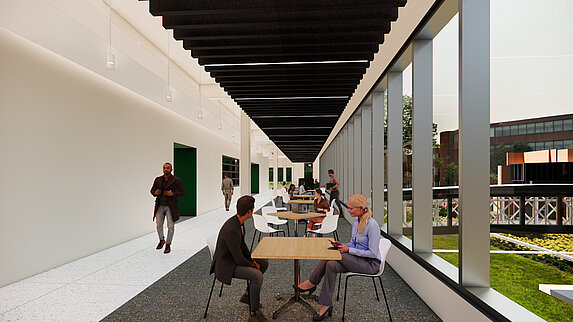
More than 2,400 students currently enrolled in the College of Engineering do not have a centralized space to gather with their peers or mentors. The Richard Offerdahl '65 Engineering Complex will unite students, faculty, staff, and industry partners in one concentrated hub of creativity and discovery and connect the existing engineering complex buildings. The College Commons will provide a vital integrated and flexible space for industry engagement, outreach activities, study groups, student organization meetings, tutoring, and advising.
PRECISION AGRICULTURE HEADQUARTERS
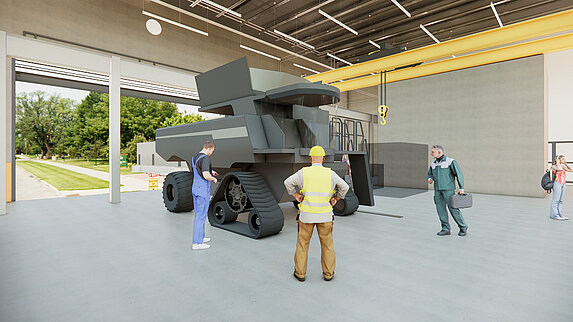
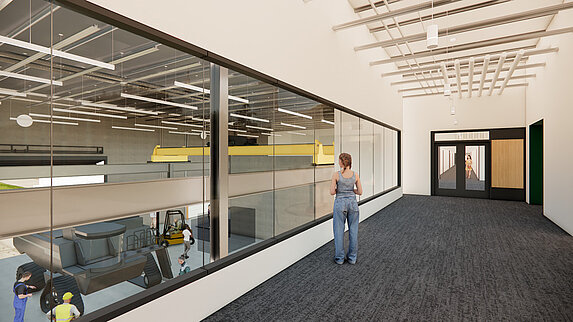
Offerdahl Hall will become the new 7,000-square-foot home for the department of agricultural and biosystems engineering, including the cutting-edge precision agriculture program. A state-of-the-art high-bay research laboratory large enough to accommodate full-size agricultural machinery and other technologies will be constructed. Students, faculty, and staff will be able to design, develop, implement, and test new technologies for precision agriculture on farm implements, autonomous drones, and agricultural processing equipment to improve the efficiency of tomorrow’s farming operations. It will also include bioprocessing labs dedicated to environmental soil and water teaching and research.
GOALS FOR THE RICHARD OFFERDAHL '65 ENGINEERING COMPLEX
- Contribute to a diverse talent pool of engineers who will find solutions to complex future problems and drive advancements in the industry,
- Provide an unparalleled educational experience that equips graduates with the practical skills and competencies employers need in a fast-changing industry,
- Accelerate critical program growth related to artificial intelligence, cyber security, precision agriculture, data science, energy stewardship, advanced infrastructure, manufacturing, and robotics,
- Create a safe and collaborative learning environment where students from diverse backgrounds can work together, exchange ideas, and develop new solutions using modern technology
- Inspire students of all ages to get involved in engineering and computational science activities, and
- Nurture and develop a strong pipeline of students who will pursue STEM-focused degrees and careers, making a difference for our region and the world.
Together, the Bison community can ignite innovation and empower the next generation of engineers and scientists who will help shape our world.
